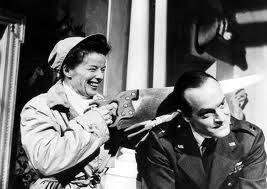 Had Bob Hope's plane crashed into the Atlantic as he was flying to the UK to film The Iron Petticoat in 1956, his place in show business would have been assured. No less a personage than Woody Allen named Hope his favorite comedian, and the one he emulated when he started doing stand-up. (And what are Bananas, Sleeper and Love and Death if not Bob Hope comedies for a with-it crowd?)
Had Bob Hope's plane crashed into the Atlantic as he was flying to the UK to film The Iron Petticoat in 1956, his place in show business would have been assured. No less a personage than Woody Allen named Hope his favorite comedian, and the one he emulated when he started doing stand-up. (And what are Bananas, Sleeper and Love and Death if not Bob Hope comedies for a with-it crowd?)  |
| Trust me, this is how you want to remember him. |
To watch Hope in his prime -- roughly 1937 to 1952 -- is a pleasure few funnymen can offer. With his impeccable
delivery, pleasant singing voice and surprisingly agreeable soft-shoe dancing style, Hope was a comedic actor of the first order. Had history taken a different turn, UCLA would be holding retrospectives in his honor. Comedy classes would teach "The Hope Style." Perhaps there would be an honorary "Bob Hope Award" given each year at the Academy Awards for the most deserving comedic actor.
Fortunately for his family but not the rest of us, Hope arrived at Heathrow Airport safe and sound to start his 47-year freefall into mediocrity and beyond. It was an experience both Hope and co-star Katherine Hepburn would eventually pretend never happened. If only.
 |
| These two aren't nearly as uncomfortable with each other as you'll be when watching The Iron Petticoat. |
Lockwood would rather go on leave to visit his rich aristocratic fiancee. But in no time, Chuck and Vinka fall in love. And when Soviet spies arrest Vinka for treason, Chuck risks his life to rescue her. When he's captured, too, they're taken to the USSR
-- only to be treated as national heroes while the Russian spies are arrested for... well, again, I'm not sure. By this time, I was just waiting for THE END to appear so I could say that I watched The Iron Petticoat and survived.
Where to begin? Well, you can blame the script, but that's a tricky thing. Ben Hecht, who wrote the original version of the screenplay, was no hack. He and his former writing partner, Charles MacArthur, were responsible for The Front Page, one of the all-time great Broadway shows, as well as two of the most underrated movies of the 1930s, The Scoundrel and Crime Without Passion. Hecht wrote The Iron Petticoat specifically for Katherine Hepburn. It might have made a fine movie for she and Spencer Tracy, but Ol' Ski Nose got his fingerprints on it first. Or rather, his gag writers' fingerprints.
 |
| Kate thanks Bob between takes for his contributions to the movie. |
His dated references to Estes Kefauver and the like further harm the movie. Hecht's script -- presuming the gag writers didn't touch anyone else's dialogue -- isn't perfect to begin with. A cliched Southern senator and some badly-directed slapstick with the Soviet spies aren't as funny as they might have appeared on paper. But without a doubt, Hope's awful one-liners further spoil an already questionable brew.
 |
| Bob turns to drink when discovering he has to pick up the check. |
Katherine Hepburn is game, but dialect comedy isn't her forte. Her stern looks certainly resemble those of a Russian officer, and she actually looks good in her military uniform.
But once she switches to "capitalistic" feminine items -- negligees, gowns, lacy underwear -- she's, frankly, unattractive. Maybe it's the fashions of the day, maybe it's the fact that Hepburn was never particularly feminine to begin with.
Whatever it is, it puts to lie, as do her movies with Spencer Tracy, the idea of Hepburn as an icon for liberation. Because by the final reel in these movies, all she wants to do is give up her career and make breakfast for hubby. And in The Iron Petticoat, she wants to do it in Indianapolis, Indiana for no better reason than Hecht thought it would sound funny in a Russian accent.
 |
| Really, don't you want to slap him silly? |
The Iron Petticoat also marks, I believe, a major turning point for Hope, one that forever changed how he regarded his audience. His once ingratiatingly sly grin transforms here to a permanently contemptuous sneer. It's as if he's telling us, This might be crap but I don't care -- I'm Bob Hope, and you'll take whatever I dish out. How wrong he was.
 |
| No matter what language, The Iron Petticoat is appalling. |
Neither Hope, Hepburn nor critics were happy with the result. Hope, in fact, pulled the movie from circulation in the mid-60s, while Hepburn never mentioned it again. That TCM helped to recently engineer The Iron Petticoat's first TV airing in well over 40 years (the original British print, with Hecht's writing credit intact) was something of a coup. But as we saw with Russia, coups aren't always what they're cracked up to be.
 |
| Bob Hope winds up his career in The Road to Zombieville. |
His TV specials were even worse, with titles like Bob Hope's Pink Panther Thanksgiving Gala. And his writers were still force-feeding increasingly stale jokes into pathetic scripts hoping for foie gras. What ultimately emerged at the other end, instead, was something far more odious.
*******************************
No comments:
Post a Comment